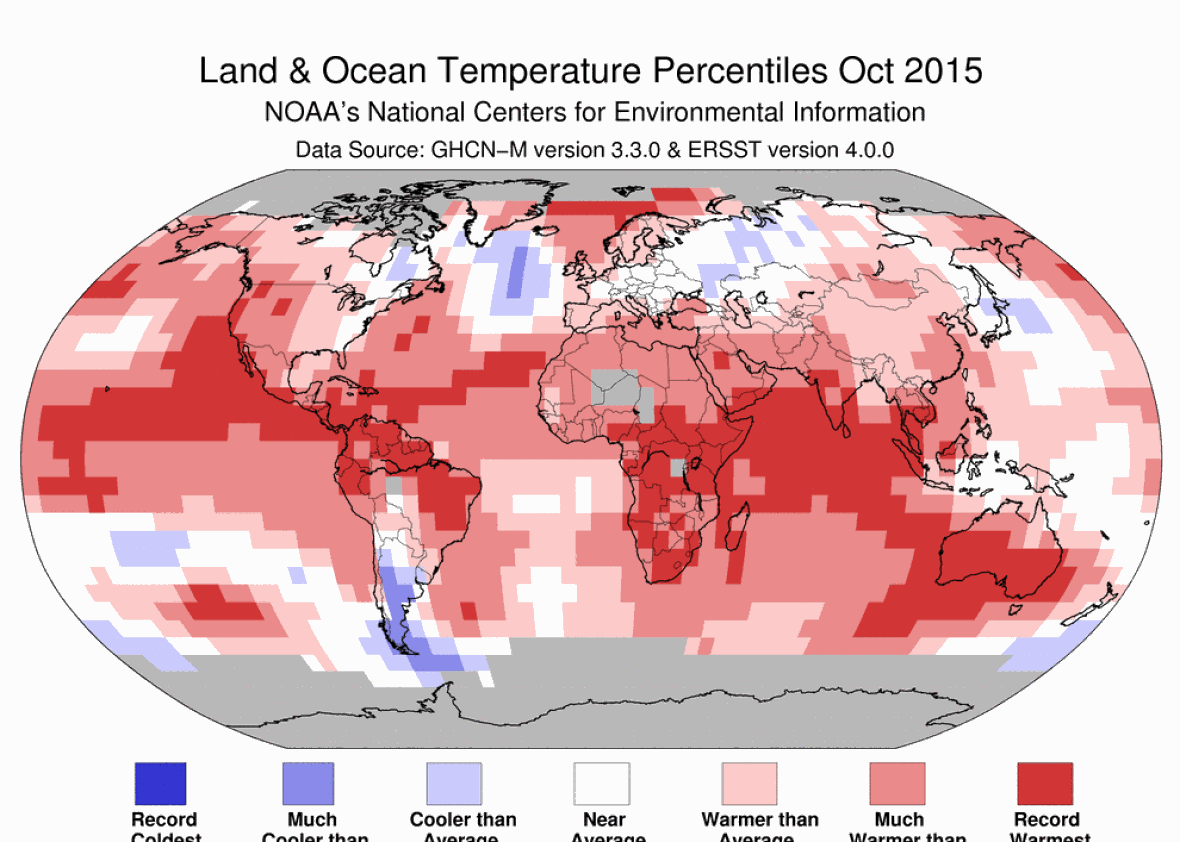Last week, I wrote about new evidence that shows Earth’s climate system has moved into an unprecedented state over the last several months, at least since the invention of agriculture 10,000 years ago. This week, our planet doubled down—raising new concerns about adverse impacts worldwide, some of which have already begun.
El Niño—a periodic warming of the tropical Pacific Ocean—is the most immediate reason for this year’s global heat wave, but global warming has also been stashing heat in the oceans for decades now. There’s now a 99.9 percent chance that 2015 will be the warmest year on record and most likely by a wide margin.
Fresh data this week show that the current El Niño is now the most intense ever measured, at least on a weekly basis, pushing ahead of huge events in 1982–83 and 1997–98, and likely 1877–78 as well. (Ocean data from the 19th century is less reliable than that from the Space Age.) On Twitter, one federal meteorologist said the new data were so extreme, he was initially in disbelief that they were accurate.
Broader measures of El Niño are updated only monthly or seasonally, and this El Niño is still strengthening, so we still don’t know for sure how huge it will become. But one thing’s for sure: Humanity has never before had to deal with global oceans quite like this.
“This event is playing out in uncharted territory. Our planet has altered dramatically because of climate change,” said Michel Jarraud, the secretary-general of the World Meteorological Organization, in a statement on the latest data. “This naturally occurring El Niño event and human induced climate change may interact and modify each other in ways which we have never before experienced.”
Data from NASA and the National Oceanic and Atmospheric Administration confirmed that October 2015 was the most unusually warm month ever measured, beating the previous record set just last month. Record warmth was observed on every continent and in every ocean.
For a taste of how weird last month was: Octobers have been warming by an average pace of about 0.11 degrees Fahrenheit per decade since 1880. But October 2015 broke the monthly record by 0.2 degrees, essentially fast-forwarding global warming by more than 10 years. Such a surge has never been witnessed before.
All this extra heat is having a huge effect on the planet’s ecosystems and cities, with the most acute impacts in Indonesia, where massive forest fires have made more than 500,000 people sick due to persistent smoke and haze. A spokesperson for Indonesia’s national weather service has called the fires a “crime against humanity.” In India, weak monsoon rains linked to El Niño have created food shortages. Food shortages are also expected over the coming months across East and Southern Africa, Central America, and Southeast Asia.
Earlier this summer, NOAA declared a global coral bleaching event, warning that the exceptionally warm oceans could cause permanent damage. As of this week, heat stress on coral reefs south of Hawaii moved literally off the charts:
Further north, a confused sea turtle was spotted last week in the San Joaquin River in central California—thousands of miles north of its typical range.
Though the world is a vastly different place now, millions of people died in El Niño–related famines in the 1870s, and tens of billions of dollars of economic impact were blamed on the 1997 event. The biggest achievement since then has been improved prediction. In California, officials in San Diego have declared a preemptive state of emergency to help prepare for likely heavy rains. The city of Los Angeles is stockpiling sandbags.
The impacts aren’t all bad, however: The world’s driest desert in Chile, the Atacama, has sprung to life in recent weeks thanks to unusual rains earlier this year—including a dazzling display of flowers.
Later this month, more than 100 heads of state, including President Obama, will gather in Paris to negotiate the first-ever global agreement on climate change.
